‘I make stars look interesting, not beautiful’: Anton Corbjin on his favourite portraits | Anton Corbijn
Anton Corbijn, speaking from his home in Kenya, holds a fried sardine between his fingers and positions it tantalisingly in front of his Zoom camera. “I’m sorry,” he says, “but somebody put these next to me and they smelled so good I had to take a bite.”
Fried fish notwithstanding, Corbijn lives a “healthy life” in Africa and the distance to Europe hasn’t interfered with his work. His latest exhibition – which can be seen at his studio in the Hague and online at de-pury.com – positions him as a portrait photographer across a wide range of stars and subjects. Is this because the man behind some of music’s most famous images, from Joy Division to U2, is frustrated at being pigeonholed?
“No,” he says. “I’m very proud of what I did in that genre. I just don’t feel that music photography is all I do. I’m a portrait photographer. It’s just that up until 1989, I only photographed musicians. Then I moved to LA, changed camera formats and added more subjects – actors, painters, models, directors – always people who are in the public eye and creative.”
Before I let him return to his sardines, we discuss five iconic images from the new show.
‘I blew my cooker money on the flight out to Chicago’
David Bowie, Chicago, 1980
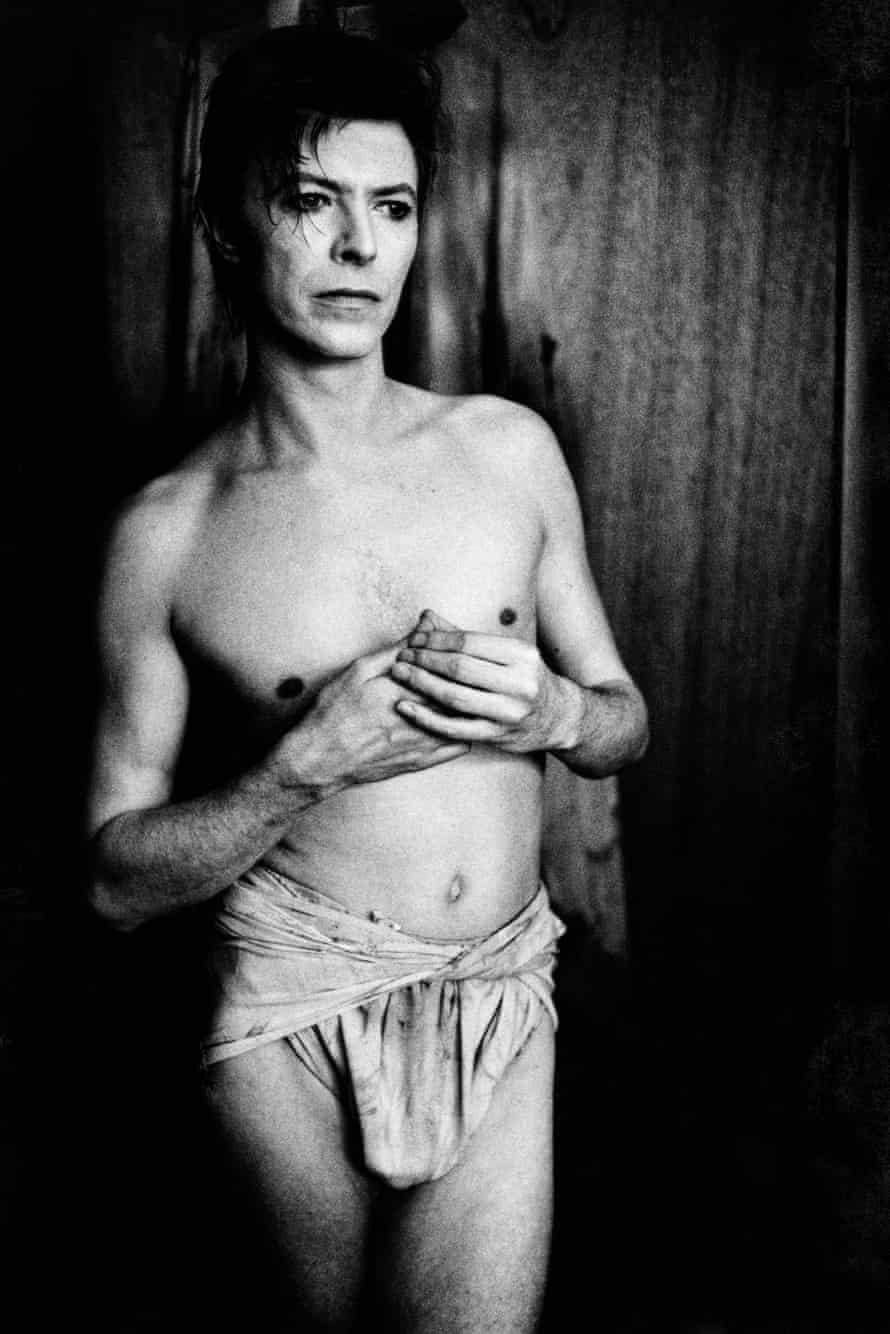
I was working as the main photographer at the NME and had just moved into a squat in east London. The NME’s Angus MacKinnon was going to interview David in Chicago but they wouldn’t allow a photographer. Thankfully, my parents had given me money to buy a cooker so I spent it on a flight and just turned up at the interview. It cost £800, a lot of money for me at the time, but these things pay off if you make life an adventure.
Bowie’s assistant said: “What are you doing here? We had a deal – no photography.” Luckily, when David had visited Holland once, I had left my portfolio at his hotel. The next day, I was given it back with a note saying “thank you”. I thought it was just a “piss off” really. But when I told the assistant, she looked in her notebook and realised she’d scribbled down: “Best photographer in Holland – Anton Corbijn.” So I was in with a chance. She told David and he gave me permission. It was very kind, as he wasn’t actually allowed to be photographed in stage costume.
The shoot was brief, but the next day we met in a bar to do more. He was an amazing guy, a gentleman, funny, all that stuff, but also extremely good looking and aesthetically aware. I remember there was a jukebox and he put on Frank Sinatra’s That’s What God Looks Like To Me.
This is one of my favourite photographs. It’s not just a shot of Bowie, it’s a Christ-like thing. That’s what you hope for when you take photographs: that it transcends all the usual stuff. A lot of the credit has to go to him. It’s a beautiful gaze. What was he thinking? I don’t know. Maybe: “I’d like a beer.”
‘I didn’t know he was ill’
Virgil Abloh, Chicago, 2019
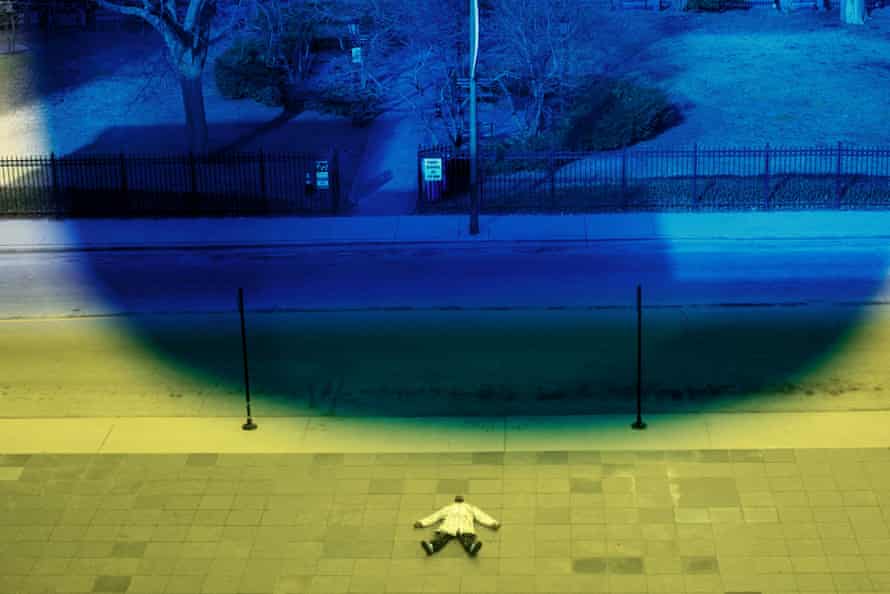
Virgil was preparing for a show of his fashion designs at Chicago’s Museum of Contemporary Art. This was taken just outside, for Vogue. The museum had windows with coloured material on them and I thought it would be interesting to shoot through that. It’s a playful image. I am a lot more playful than people think, though perhaps that comes out more in my videos.
This was taken in the same year Virgil found out about his health [he was diagnosed with a rare cancer in 2019 and died in 2021]. Of course, I did not know anything about that. This image looks like he is in daylight with night encroaching. Sometimes, pictures can take on different meanings afterwards. I did a picture of Joy Division when I moved to England in 1979: Ian Curtis is looking towards the camera and the others look away. It’s as if I knew something but of course I did not.
It did affect me when I found out Virgil had died because he was an incredible talent. He wasn’t your normal kind of designer. He was very smart. Far too young to leave.
‘I changed the number to 33 as that’s the age Jesus died’
Damien Hirst, Stroud, 2011
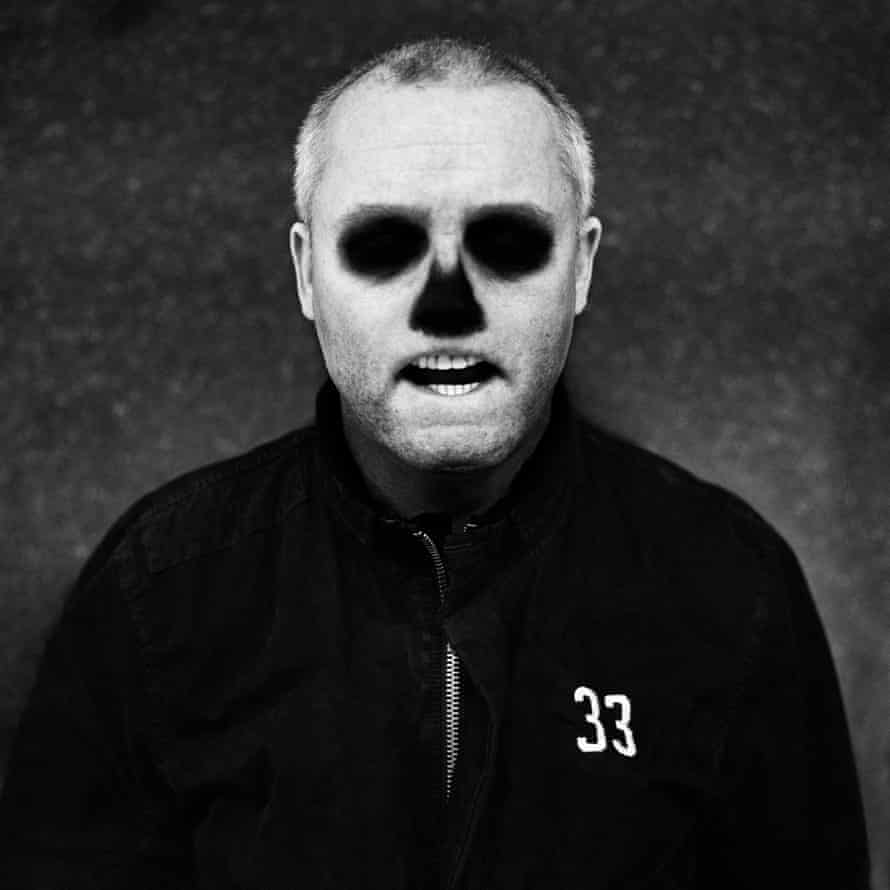
This is more of a concept photograph. The theme, obviously, is death. The eyes and nose were done with makeup as Damien stood in front of the camera. Behind him is one of his works, one that consists of dead insects. His jacket, from the G-star label, had a 3301 logo on it. I took the “01” off in post-production because 33 is the age Jesus died.
This image references For the Love of God, the work Damien made of a skull encrusted with 8,601 diamonds. It wasn’t a collaboration: I just asked him if I could do a picture like that and he was OK with it. And it looks like a $50m picture to me!
Damien is quite a normal-looking guy but with photography there is always a way to make the image work. I am a fan of his audaciousness. Some of his ideas are beautiful, some challenging, others not. But that’s not so important. He’s an innovator.
‘You’d never ask musicians to take their clothes off’
Naomi Campbell, London, 1994
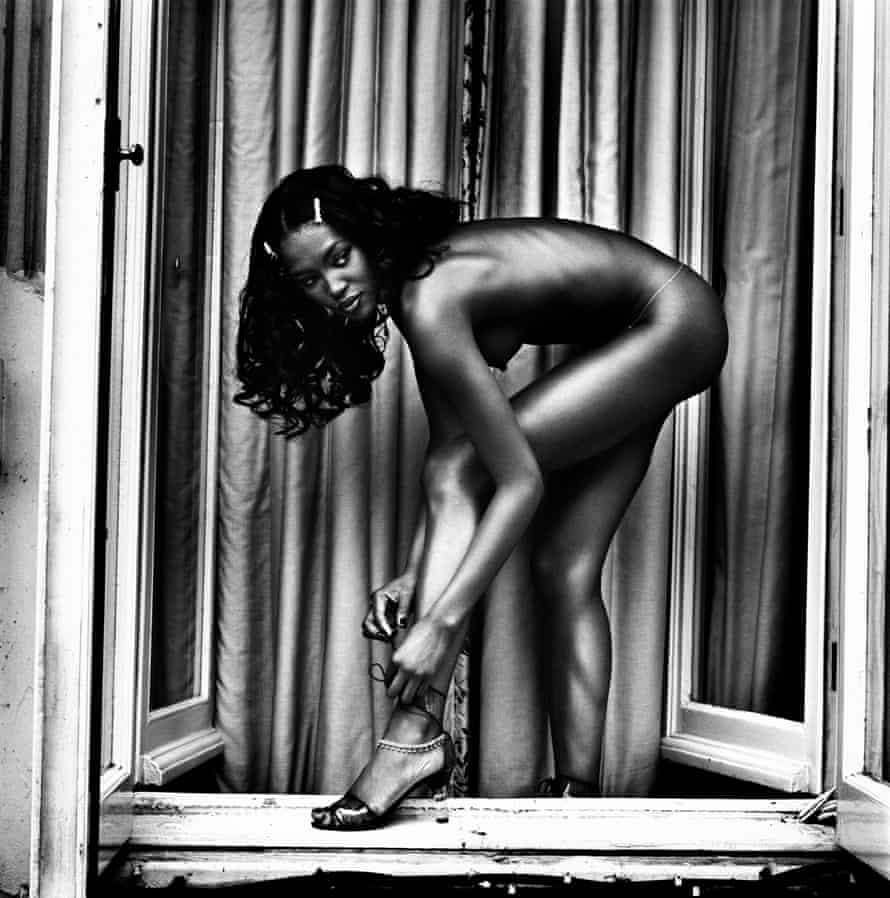
When I was younger, I had real problems with outer beauty. I focused on what was beautiful on the inside and how to make people look interesting rather than beautiful. With models, I never knew what I could add to the apparent beauty already there. But then I met a few and they became people to me, rather than models.
Although I took this in the 1990s, it wasn’t published until 2020 in my book MOØDe. I had been going through my archives and found all these pictures I had forgotten about. That’s what tends to happen: your selection becomes your memory of the entire shoot. You forget what else you have.
This was one of the images I rediscovered. I liked it, with the shoe. It was taken in a hotel near Hyde Park. It felt natural to shoot Naomi nude because she was incredibly beautiful and natural looking. She has always been great to me. She knows how to give you something. Yes, I am aware of her fierce reputation but I never had a run in with her.
Shooting musicians was nothing like this. Back in the 1970s, music was a very male-dominated field. You wouldn’t ask any of them to take their clothes off!
‘And what’s your name again?’
Miles Davis, Montreal, 1985
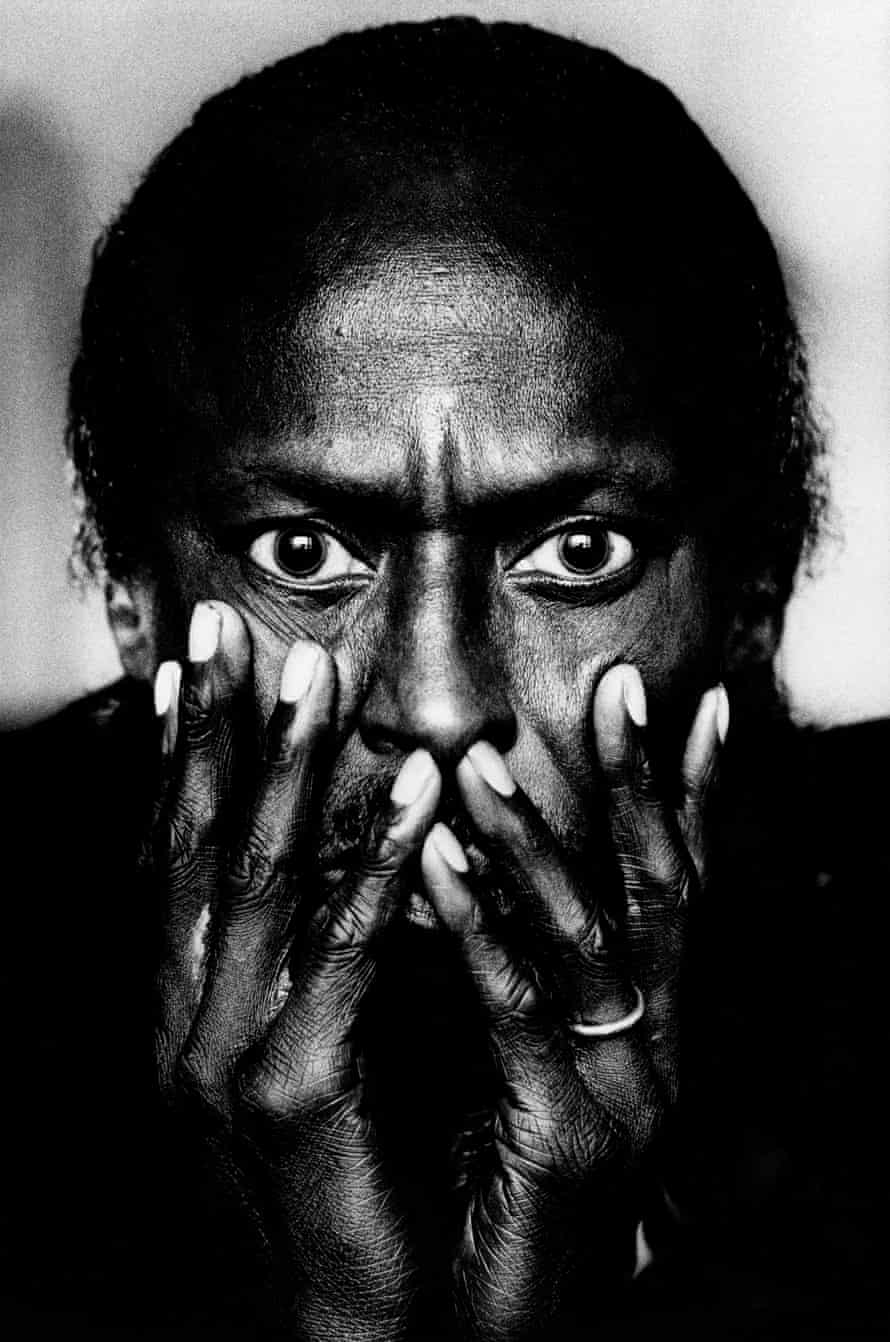
Miles was doing an interview with Richard Cook and I was allowed to sit in but not take pictures. He wasn’t particularly nice to Richard. Whenever he answered a question, he would say: “And what’s your name again?” I had a shoot with him the next day, five or six minutes in a hotel room. He gave me a drawing he’d done which was really nice. I still have it.
Miles was a beautiful man. His stare here is very intense. I guess that’s how he lived. This was taken later in his life, when he was in a lot of pain. He took injections of goat serum that affected his pupils. That’s what is striking in this picture. His pupils are as large as you’ll ever see.
There’s a famous story of Miles having dinner with Ronald Reagan at the White House. Nancy says: “And what did you do to be invited here?” Miles replies: “I changed the course of music five times. What did you do apart from fuck the president?” I don’t know if it’s true but I like it.
We shot near the window because I always use available light. I can’t recall why Miles took this pose but he liked it and wanted to use it for the album Tutu. Sadly, Warner Brothers said it had to be done by a famous photographer and I obviously didn’t qualify at the time. So they asked Irving Penn. I love the image Penn took but you can see where the inspiration comes from.
Miles has such a strong, intense face. It’s so beautiful. A lot of photographers who photograph me ask me to do the same pose. I never look half as good.
de PURY presents: Anton Corbijn is at de-pury.com, 24 January to 28 February, and on show at the photographer’s studio in the Hague by appointment.
